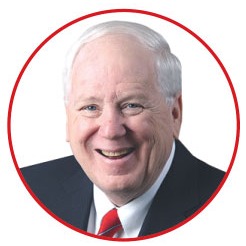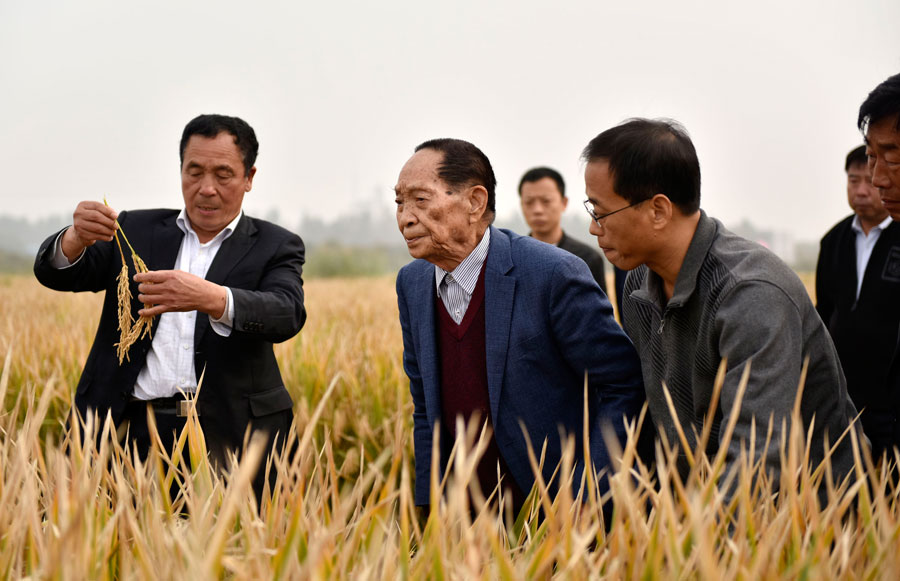
1942 in New York City
EDUCATION:
BA, political science, Loras College, Iowa
MA, political science, Marquette University, Wisconsin
PhD, international relations, University of Maryland
CAREER:
1967-99: Diplomat, US State Department
1996-99: US ambassador to Cambodia
2000-present: President, World Food Prize Foundation
HONORS:
2014: Iowa Medal
The Iowa diplomat with 'two interesting stories'

Shaking hands
Xi Jinping returned to Iowa 27 years later as vice-president. The trip in February 2012 saw him deliver the keynote speech at the US-China Agricultural Symposium held at the World Food Prize Hall of Laureates in Des Moines.
As he escorted the Chinese leader into the hall, Quinn recalled telling him: "You have such an interesting story, how you came to Iowa as a young man, were treated so nicely and feel such a special attachment to our state. ... I'm going to commission a painting to hang in my building, just about your visit."
As they shook hands, Quinn told Xi he was one of the few people in the US who had shaken hands with both him and his father.
"Xi stopped in his tracks, and turned and looked at me. He had a big smile on his face and said to me, 'You have two interesting stories,'" Quinn said.
As a result, he realized the art work to be commissioned needed to tell both stories, recognizing a family that had played such a major role in the development of modern China and its personal connections to the Midwest state.
Two Interesting Stories by artist Clint Hansen depicts the visits of both father and son.
A country transformed
Quinn said when he visited China in 1979 the country had no modern buildings, few cars, and people basically dressed the same, in either black, blue or olive-green clothing. Most people traveled by bicycle.
So he was "startled" when he came across a coffee shop at a Guangzhou hotel.
"It had neon signs, flashing lights, new Formica tables, and waitresses in short dresses. The coffee shop was to me the sign of the Big Bang, the sign of modernization," Quinn said, adding that he soon learned Guangdong was a pioneer of the country's economic reform, which today is expressed as socialism with Chinese characteristics.
In 2004, Quinn was at a hotel in downtown Beijing attending an agricultural forum, and he walked to a nearby Starbucks for a cup of coffee.
"I looked at all the signs for everything, they were only in Chinese," he said. "This Starbucks existed basically to serve coffee, pastry and others to Chinese customers. There were very few Westerners out there."
What this told him, he said, was that China had so many educated, accomplished, high-income individuals that Starbucks had opened outlets just to cater to them.
"I tell people all the time that China is the most transformed country on Earth, that no other country has done more in the past 40 to 50 years," he said.
Quinn worked for decades in Asia, mostly in Vietnam and as the US ambassador to Cambodia, during which, he said, he learned two important life lessons: The power of rural roads and the power of agricultural technology.
"Where the rural roads end, hunger, poverty, political instability, conflict and terrorism all begin," he said in an interview with UC Food Observer in February 2016.
He added that perhaps the best example of upgraded rural roads having a dramatic impact was in China: "In this period - 1980 to 2015 - China has gone from having 60 percent of its population below the poverty line to only about 10 percent. That's also the result of many other things, including changes in policy, research and the restructuring of economic systems, but China also significantly upgraded its rural roads infrastructure during that period."
Call for nominees
That may partly explain why Quinn was so intrigued by President Xi's signature Belt and Road Initiative, which highlights building roads and other infrastructure to ramp up connectivity in Asia, Europe and Africa.
"This will spread prosperity to other countries, just as building roads internally in China and building roads internally in the US would do," Quinn told China Daily.
In 1993, He Kang, as minister of agriculture, traveled to Des Moines to receive the World Food Prize, a $250,000 award. The prize was created in 1986 by Norman Borlaug, winner of the Nobel Peace Prize, to recognize scientists and others who improve the quality and availability of food supplies.
While He was recognized as a representative of China's efforts to boost agricultural production exponentially, Yuan Longping, the "father of hybrid rice", received the World Food Prize in 2004 for developing a plant that yields more grain than anyone thought possible.
"He (Yuan) is an incredible example of Chinese scientific achievement," Quinn said. "And he's spreading his knowledge and his capacity through his National Hybrid Rice Research and Development Center."
The World Food Prize Foundation sends US high school students to study at the center each year.
"I have to say, however, that we need more nominations of individuals from China," said Quinn, who has headed the foundation since 2000. He said the prize has received about 10 nominations from China in that time, not a lot considering the country's size, research and agricultural development.
The number of Chinese nominees is fewer than from India, where Borlaug once worked and where the prize is much more widely known, he said.
The foundation pays close attention to food safety, nutrition, irrigation, and the use of science and satellites for agricultural precision, food transportation and storage.
"I'm sure in every one of those areas, there's somebody in China, probably more than one person in China working on significant developments, for which they could be nominated for our prize," he said. "They just need to be documented and submitted."


